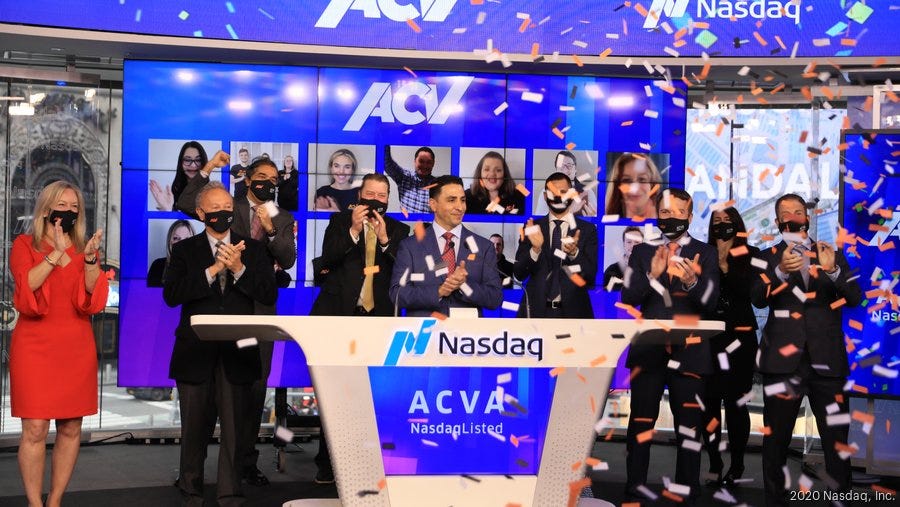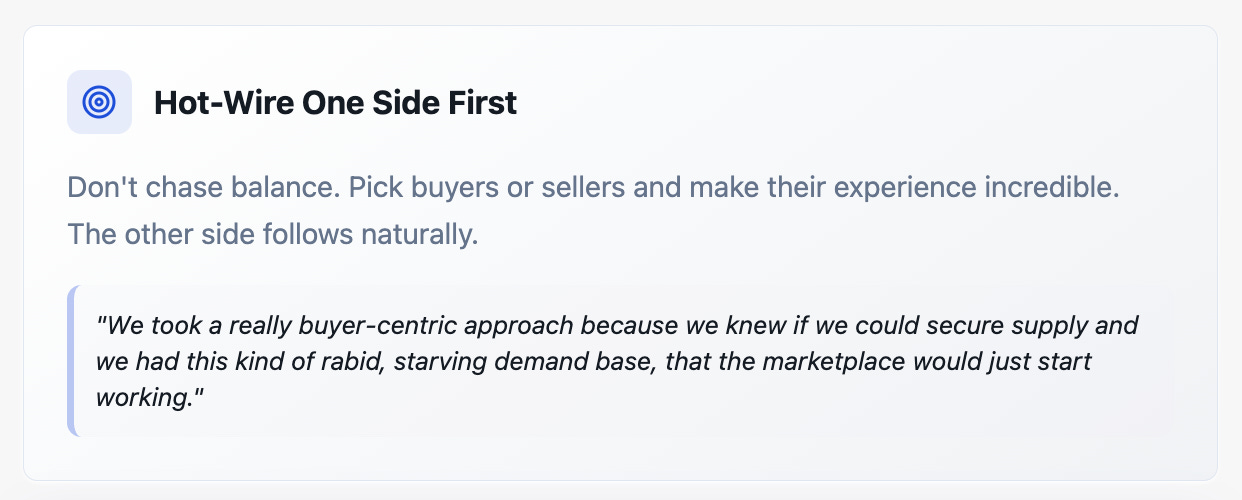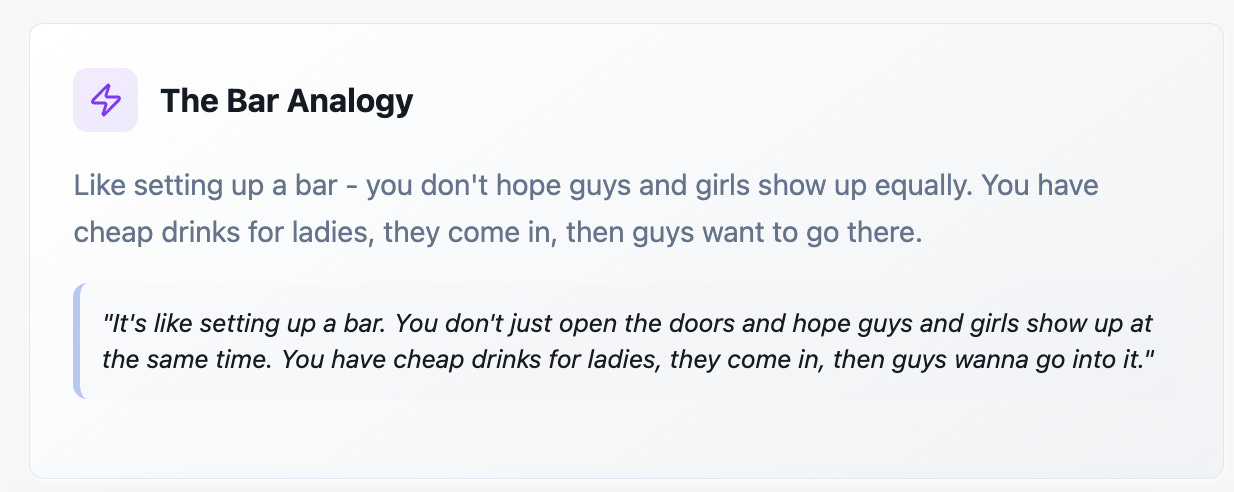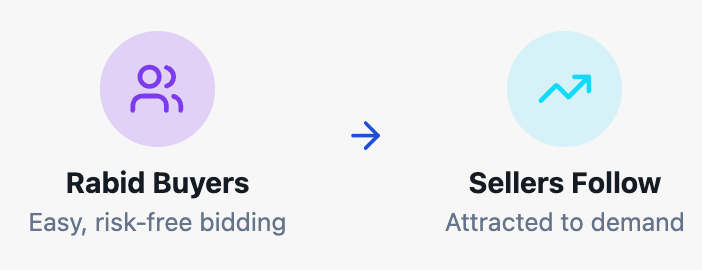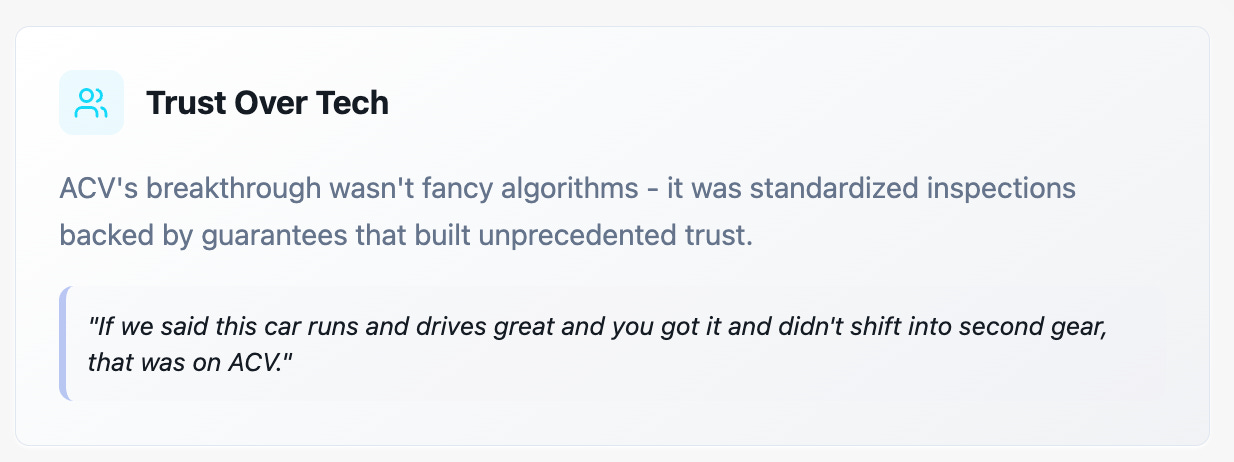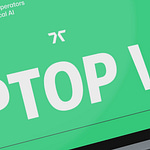Today’s episode is brought to you by Parafin - the leading provider of ready-to-launch financial products that help your merchants grow. Check out what Parafin can do to drive revenue, retention, and TAM at your business!
Alright, let’s dive in…
AI is enabling net new SaaS experiences by eliminating or minimizing the existing UI by Menlo Ventures
Extend, a provider of spend management software to banks, raised $20m in equity and debt, per Axios Pro. B Capital led the equity tranche, joined by March Capital, Point72 Ventures, FinTech Collective, and Commerce Ventures.
Meta announces new AR glasses that aren’t bulky. What are all the Vertical AI use cases for this?
Should we be worried about AI margins? Great piece here by Janelle Teng.
Jack Greco, Co-Founder of ACV Auctions (NYSE: ACVA)
A guy raised on a dairy farm in upstate New York, fired from every job he held in his 20s, suddenly co-founds a company that revolutionizes how car dealers buy and sell vehicles online—launching Buffalo’s first unicorn and taking it public in a $2.7 billion splash.
That’s Jack Greco, the unassuming force who’s now channeling his operator’s grit into fueling the next wave of startups as a serial angel investor and VC.
At 40-something, he’s not just a success story; he’s a one-man ecosystem accelerator for America’s overlooked heartland.
Greco’s origin tale reads like a gritty indie flick. Growing up milking cows near Rochester, NY, he hustled through the University of Rochester (BA in Economics) and Simon Business School (MBA), but corporate life? Not his jam. “Fired from every job,” he quips in interviews—consulting gigs and early ventures that taught him resilience the hard way. By his late 20s, a surprise baby on the way lit a fire: no more scattering efforts across 10 ideas. He zeroed in on founding.
Jack’s story starts in a small farm town where he grew up sneaking into car auctions for the sheer Americana of it—think chewing tobacco, butt cracks, and the smell of gas and oil.
His dad, an antique dealer, gave him a front-row seat to the mechanics of trading and auctions, even if cars weren’t his thing. Fast-forward to 2014, when Jack teamed up with Joe Neiman (a car dealer) and Dan Magnuszewski (a tech whiz) to tackle a broken system. The spark? Neiman’s auction woes—endless road trips to inspect beat-up cars, haggling in smoke-filled halls.
Greco saw the gap: a transparent, digital wholesale marketplace for dealers, powered by digital inspections and live bidding. They bootstrapped in Buffalo, a “tier-two” city far from Silicon Valley’s glare, winning $1M from the 43North pitch fest that year.
Skeptics scoffed at building a unicorn outside NYC or SF. Greco? He leaned in, raising $350M from heavyweights like Bessemer and Fidelity, scaling to 1,600+ employees and $1B+ in sales, and taking the company public in 2021.
Jack is this week’s Vertical Titan.
We had an EPIC time jamming with him on AI-Native Marketplaces…
Hot-Wiring Marketplaces: Jack Greco’s Playbook for Building Billion-Dollar Marketplaces
Back then, 30 million cars were traded into dealers annually, but the process was stuck in the stone age: dealers calling buddies to offload trade-ins, schlepping to physical auctions with 60-second bidding windows, or doing their own inspections.
Cash got tied up, information was spotty, and trust was nonexistent. Jack nailed it when he said this wasn’t a tech problem—it was a trust and information problem. ACV’s big unlock was standardizing inspections and backing them with guarantees.
They sent inspectors to dealership lots with $100 worth of AutoZone tools, spending 20 minutes per car to create detailed condition reports—way more thorough than the minute-long glances at physical auctions. If a car didn’t run as promised, ACV ate the cost. This buyer-centric approach created what Jack called a “rabid, starving demand base,” pulling sellers in naturally. As he put it:
“We took a really buyer-centric approach because we knew if we could secure supply and we had this kind of rabid, starving demand base, that the marketplace would just start working.” — Jack Greco
The result? ACV scaled from zero to $1B+ in sales, with 1,600+ employees and millions of cars processed annually. Their go-to-market was pure hustle: territory managers signed two dealerships a month, planting “tomato plants” in regional markets like Buffalo and Syracuse. Be first in a market, and you own the halo accounts forever. By 2016-17, they went from $1M to $12M in revenue, a growth spurt that had VCs like Nic (my co-hosts) kicking himself for missing out.
“What took us forever to build with ACV, a kid with a case of Mountain Dew on a weekend, could probably build something even better than what we had for our first couple years.”
— Jack Greco
This floored me. In 2014, building a mobile-first marketplace was a slog—custom code, clunky UX, and endless debugging.
Today, no-code platforms and AI tools have obliterated those barriers. A kid hopped up on Mountain Dew could whip up ACV’s early prototype in a weekend. That’s both an opportunity and a challenge.
The barriers to entry are lower than ever, so your moat has to come from execution, market understanding, and solving real problems. Tech is table stakes; trust and hustle are the differentiators.
“Hot-Wiring the Marketplace” Flywheel
Jack dropped a gem that flipped my thinking on marketplaces. Forget the balanced chicken-and-egg approach. His take? Pick one side and hot-wire it to kickstart the flywheel.
For ACV, it was buyers. They made bidding stupidly easy—clear photos, transparent condition reports, and a guarantee that took the risk off dealers’ plates. Sellers followed because who doesn’t want to tap into a hungry buyer pool? Jack’s analogy is pure gold:
He calls this the “starter vs. engine” principle. Your starter (the hot-wire trick) doesn’t look like your engine (the scaled business).
For TCGPlayer, Jack’s biggest angel investment (sold to eBay), it was blogging about trading card strategies to pull in collectors, then letting them sell cards. For an event he’s hosting in Buffalo, it’s luring VCs with hot startups to draw founders. Every marketplace needs a spark—find yours, and the network effect spins.
“ACV Is Not a Tech Company”
Here’s where Jack challenged my SaaS-founder brain:
“I still do not believe ACV even currently should be considered a technology company. It is a tech-enabled service business that has a field service aspect to it more than it does like a deep tech play.” — Jack Greco
This hit hard. ACV’s a billion-dollar public company, yet Jack sees it as a service business wrapped in tech, not a tech company. The tech—mobile bidding, condition reports—was a means to an end: trust and efficiency in a human-driven market.
They never chased 70% SaaS margins because the business was about moving cars, not selling software. This is a wake-up call for founders obsessing over tech stacks. Build a business first; let tech serve it.
AI’s Role:
Shrinking the Middle, Keeping Humans at the Ends
Jack’s not an AI bro (he uses ChatGPT for silly kid questions, but his take on AI in marketplaces is crystal clear. AI doesn’t replace humans—it shrinks the grunt work in the middle, letting people focus on relationships and trust.
He’s on the board of Akito, an AI-driven healthcare startup that’s boosting cardiologists’ throughput from 14 to 40 patients a day. How? AI triages the first six minutes of a visit—sussing out symptoms, running them against medical knowledge, and prepping care plans. Doctors still make the call, but they spend more time on complex cases or building patient trust. This resonates with my VsaaS roots. Software sprawl is the bane of service businesses—nobody wants to click buttons and update CRMs all day. As I said on the pod:
“The software is not supposed to be a pain in the ass. It’s not supposed to be there to click a bunch of buttons and fill out a bunch of text boxes” — Luke Sophinos
AI’s holy grail is Uber-level simplicity: massive complexity hidden behind a seamless UX. Jack’s betting on “blue-collar” verticals—pest control (Peshare), ag, mining—where AI optimizes logistics or underwriting (like Splash Financial’s $70M raise) but keeps humans at the front and back ends. Waitresses will still charm for tips; AI just ensures the kitchen doesn’t waste food.
Why Vertical Marketplaces Win
Jack’s a B2B guy because “humans are fickle.” Businesses are logical, sticky, and predictable. Vertical marketplaces in “boring” industries—think pest remediation subscriptions or autonomy for combines—are his jam. Why? They’re defensible. Unlike horizontal AI plays chasing supernova growth with shaky retention (some valued at 225x revenue—yikes), verticals nail specific workflows and build moats through trust. ACV didn’t try to be eBay for cars; it solved a precise dealer pain point. Retention, as Jason Lemkin screams, is SaaS’s lifeblood. Jack proves it’s the same for marketplaces.
Takeaways for Founders
Hot-Wire One Side First: Don’t chase both sides equally. Find your “cheap drinks for ladies” hack to ignite demand or supply. The other side follows.
Trust > Tech: ACV won by standardizing inspections and eating the risk. Reduce uncertainty for one side, and they’ll stick like glue.
Plant Seeds Relentlessly: Linear growth compounds. Sign two customers a month in tight markets. First-mover advantage is your moat.
AI Shrinks the Middle: Use AI to kill manual tasks (CRM updates, logistics), but keep humans for trust and relationships. That’s the magic.
Bet on Boring: Narrow, deep wedges in unsexy verticals are less likely to get “out-AI’d” and build lasting defensibility.
The Greco Gospel: Friction Is the Enemy
Jack Greco’s not just a founder who took a farm-town startup to Nasdaq—he’s a guy who gets that marketplaces are human at their core. Whether it’s dealers haggling over a 2019 Camry or cardiologists triaging patients, success hinges on trust, psychology, and ruthless simplicity.
His hot-wire philosophy is a wake-up call for founders grinding on two-sided platforms. Find the spark, light the fire, and let the flywheel spin. And with AI lowering barriers (a kid with Mountain Dew could outbuild 2014 ACV), the game’s about execution and reducing friction to zero.
Have a product or service that would be great for our audience of vertical SaaS founders/operators/investors? Reply to this email or shoot us a note at ls@lukesophinos.com






